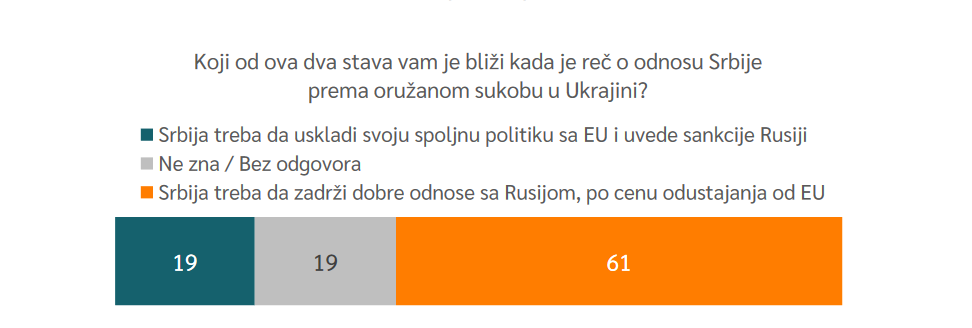Macedonians had enough of sanctions
The majority of North Macedonia's population does not support the EU's sanctions against Russia and a significant proportion is also opposed to Skopje providing military aid to Ukraine. However, it is not only Macedonians who reject the sanctions in the Balkans.
Only one-third of the population is in favour of sanctions
They do not want sanctions, nor do they want the country to send weapons to Ukraine, a public opinion poll by the Skopje Institute for Political Research reveals. The data shows that the country’s residents reject the sanctions introduced by Brussels against Moscow, Demostat reports.
People’s rejection of the Western position worries experts, and the findings showing that people are fed up with the sanctions and their impacts also raise concerns.
The latest survey found that the majority of the population ( 52.5 per cent) rejects the Western sanctions against Russia. In contrast, only 32.2 per cent are in favour of the sanctions imposed by Brussels.
Interestingly, the issue distinctly divides Macedonians and Albanians, the two most numerous ethnic groups in North Macedonia. According to the latest census, Macedonians make up about 58 per cent of the population, while Albanians represent almost a quarter. The study found that 58.5 percent of the Macedonian respondents oppose the sanctions, while nearly the same proportion (58.6 per cent) of the Albanian population supports the punitive measures.
„In a nutshell, Macedonians potentially support Russia while Albanians back Ukraine,” Dejan Srbinovski said, assessing the results in a publication on the findings.
The government in Skopje has joined Brussels anti-Moscow sanctions, and North Macedonia’s government has sent military equipment, for example T-72 tanks, to Ukraine.
Macedonian T-72 tanks left for #Ukraine. The Macedonian government follows the motto „NATO will protect us, Serbia will feed us, we will steal and sell”, but a little more … ” writes a member of the Democratic Party of Serbs in Macedonia, Miroslav Trichkovic. #Macedonia pic.twitter.com/OSWc9RyyKe
— Respendial (@Sviatoslav002) July 29, 2022
North Macedonia is a member of NATO and a candidate country for the European Union. However, its accession is progressing slowly due to hesitancy and some conditions laid out initially by the Greeks, and then the Bulgarians. Incidentally, Skopje submitted its application for EU membership in March 2004 and received EU candidate status in December 2005. More than a decade and a half later, in July 2022, the EU held its first inter-governmental conference with the country.

Macedonians aren’t the only ones opposing the sanctions in the Balkans
Unlike the Macedonian government, Belgrade has so far resisted international pressure and has not fallen in line or introduced punitive measures against Moscow, even though Serbia is a candidate country for EU membership. This decision is supported by a significant part of the population. According to a CRTA survey published at the end of November, 6 out of 10 people believe that Belgrade should rather maintain good relations with Moscow, even if this blocks the country’s accession to the European Union. On the other hand, only 19 per cent of respondents answered that Serbia should coordinate its foreign policy with Brussels and introduce punitive measures against Moscow.

